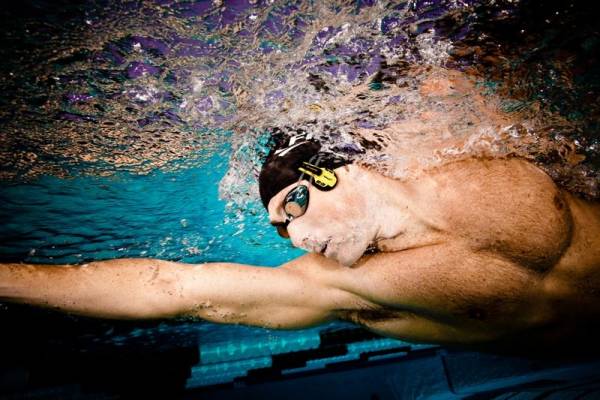I know some people who would rather die than be separated from their music during a workout. In fact, most people enjoy exercise more and claim to have better performance when listening to music, but does it truly have an effect on your workout? And what about the swimmers out there – what are they supposed to do?
In reality much research has been produced on music and exercise showing music’s positive benefits in both amateur and elite athletes. Not much research has been done, however, when it comes to music and swimming. Swimming is an excellent activity, being a full-body, low-impact sport with cardiovascular emphasis. According to a recent study published in the Journal of Strength and Conditioning Research there are approximately fifty million recreational swimmers in the United
States.
In this same study, researchers posed that same question – does music have an effect and what about the swimmers? In order to examine the effects of music on swimmers the researchers utilized a new device called the SwiMP3 produced by Finis.
As stated in the study:
The SwiMP3 device uses bone conduction to transmit sound (i.e., music) via ceramic plates and is suitable for use in shallow water while swimming. Because the fidelity of bone-conducted sound in an aquatic environment can approach the quality of air-conducted music, the influence of music on swimming performance could be similar to that observed in other participatory sports.1
To test the effect of music on swimmers, the study looked at twenty-four swimmers of a competitive nature. The average age of participants was 25 and sixty-percent of them were women. Each swimmer was outfitted with a SwiMP3 and allowed to download their own music of choice.
Study participants worked out in two swim workouts, one while equipped with the SwiMP3 and one without. All swimmers were timed for four freestyle trials of 50m in length. Participants rested for three minutes between trials and for an additional five-minute period before swimming a single, longer-distance freestyle trial of 800m.
After they completed swimming, participants also filled out a Physical Activity Enjoyment Scale (PACES). This is a survey designed to measure the enjoyment of a physical activity.
 The results of the study show when swimmers listened to the SwiMP3 their average 50m swim times improved by .32 seconds. In addition, when listening to the SwiMP3 their 800m times improved by 6.5 seconds on average. All participants also ranked their swimming experience with the SwiMP3 higher on PACES than swimming without it.
The results of the study show when swimmers listened to the SwiMP3 their average 50m swim times improved by .32 seconds. In addition, when listening to the SwiMP3 their 800m times improved by 6.5 seconds on average. All participants also ranked their swimming experience with the SwiMP3 higher on PACES than swimming without it.
In conclusion researchers determined:
The results indicated improved performance in both sprints and long-distance swimming with bone-conducted music, similar to results in nonaquatic sports with music as an adjunct.2
Meaning, listening to music helps your swim performance, just like it helps your running and other activities you regularly do while listening to music. Researchers went on to say listening to the SwiMP3 could even help your swim performance as much as taking sodium bicarbonate, which many competitive swimmers do.
Researchers also hypothesized about the time-keeping ability of music. They believe intentionally programming music for a swim workout could be just as or even more useful than the traditional tempo timers swim-athletes use to pace their strokes, and more akin to how runners use music. This is useful information for swim coaches and swim athletes alike.






